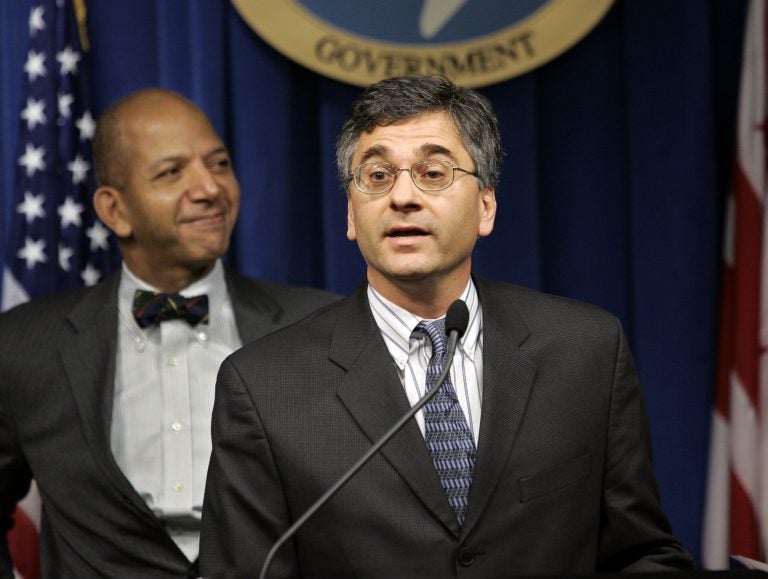New study on probation in Pa. finds problem is bigger than Meek Mill
Pennsylvania holds the dubious distinction of having one of the largest populations of people under court supervision in the country.
Listen 5:28
Pictured in 2004, Vincent Schiraldi (right) is a senior research scientist at the Columbia School of Social Work. (AP Photo/J. Scott Applewhite)
Philadelphia rapper Meek Mill, who was released from prison Tuesday, has been on probation for his entire adult life. To some, that is an unusual and extraordinary fact. But a new study examining probation and parole in Pennsylvania shows that situation is far more pervasive than previously thought.
The finding — that Pennsylvania holds the dubious distinction of having one of the largest populations of people under court supervision in the country — comes as no surprise to criminal lawyers in Philadelphia and city officials. Figures show that more than a third of those locked up in local jails were sentenced for violating probation or parole. Only Georgia and Idaho had higher rates of court supervision.
Zoom in on Philadelphia, and the statistics are even more stark: one in every 22 adults is on probation or parole, more than twice the national rate, according to new research from Columbia University’s Justice Lab.
Probation and parole have “given policymakers the illusion of safety,” said Vincent Schiraldi, a senior research scientist at the Columbia School of Social Work.
Parole and probation have become a matter of course in the criminal justice process, ensnaring those who pose little danger to the public, said Schiraldi. Yet they are forced to live under the watchful eye of government, fearful that a misstep may land them back behind bars.
“You’ve spread the net so far that, yes, occasionally you’re going to catch a shark in there,” Schiraldi said. “But while you’re doing this, you’re catching a whole bunch of minnows as well.”
Philadelphia’s top public defender and the president judge of the city’s criminal courts are now in talks about addressing some of the drivers behind the probation-to-jail pipeline.
In a confidential letter obtained by WHYY, Philadelphia Chief Public Defender Keir Bradford-Grey wrote to the courts that policies automatically sending those who violate terms of their probation to jail are creating a class of “needlessly incarcerated” inmates who place stress on an “overburdened prison system.”
Bradford-Grey wrote that “automatic detainers” that send people to jail for not following probation rules need to stop. Instead, she asked judges to hold a hearing on the violation before someone is incarcerated. If changes are not enacted, sources say, Bradford-Grey may take legal action.
Part of the reason for Pennsylvania’s soaring probation rate, Schiraldi said, is that state law allows judges to sentence defendants to a period of supervision equal to the maximum jail time they might have received for the crime.
Pennsylvania law also requires convicts released from jail to serve the remainder of their maximum sentence on parole, he said. The lengthy periods of supervision increase the likelihood defendants may wind up back in jail, driving up incarceration rates.
City officials have touted progress in cutting the city’s jail population since 2015 when Philadelphia secured a $3.5 million MacArthur Foundation grant aimed at addressing local mass incarceration. Yet officials acknowledge that decreasing the jail population further will rely, in part, on addressing probation and parole policies.
One of the some 44,000 residents on local probation is celebrity rapper Mill, whose legal saga has ignited discussion about how and why a probation violation should send someone to prison. Mill, whose legal name is Robert Williams, was sentenced in November to two to four years as punishment for repeatedly violating the terms of his probation. On Tuesday, the Pennsylvania Supreme Court ordered that Mill be released on bail after prosecutors admitted in open court that the officer who arrested him a decade ago had “credibility issues.”
Researchers said the high parole and probation rates in Pennsylvania, thrown into the public eye by Mill’s case, have even deeper effects. Although Schiraldi did not analyze Philadelphia’s supervision statistics by race, he suspected that a majority of people locked up for parole or probation violations were black men. And when urban African-American communities see themselves as such a singular focus of law enforcement efforts, he said, they view cops as illegitimate and become less willing to assist in police investigations.
“They think you’re just out to trail ‘em, nail ‘em, and jail ‘em,” he said.
WHYY is your source for fact-based, in-depth journalism and information. As a nonprofit organization, we rely on financial support from readers like you. Please give today.




